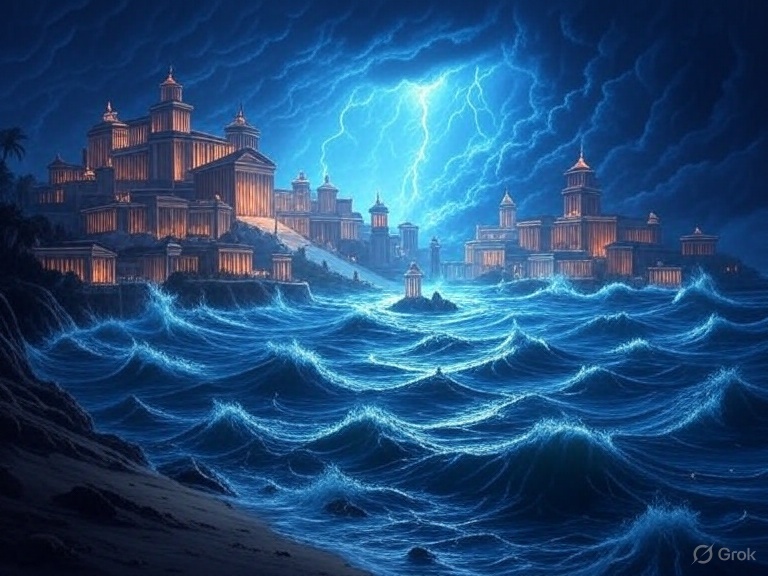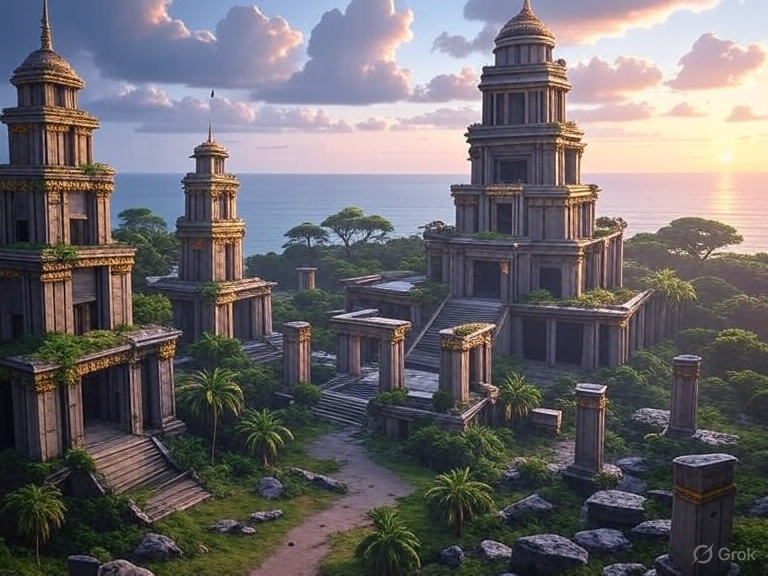For centuries, the legend of Atlantis has captured imaginations around the world. First introduced by the Greek philosopher Plato, Atlantis was described as an advanced civilization that mysteriously vanished beneath the sea. But was Atlantis real, or simply a cautionary tale? While its existence remains unproven, history does reveal remarkable lost civilizations that echo parts of the Atlantis myth. Let’s explore how ancient myths and real archaeology intersect.
The Origin of the Atlantis Myth
The story of Atlantis comes primarily from Plato’s dialogues Timaeus and Critias, written around 360 BCE. He described a wealthy, technologically advanced island nation beyond the “Pillars of Hercules” (modern-day Strait of Gibraltar). Atlantis was said to possess vast naval power, impressive architecture, and unparalleled knowledge. Yet, according to Plato, it was destroyed in a single catastrophic day and night, sinking into the ocean.
Many scholars believe Plato invented the story as an allegory about hubris and moral decay, while others suggest he may have drawn inspiration from real events like the eruption of Thera (Santorini) around 1600 BCE.

Real Lost Civilizations That Resemble Atlantis
While no conclusive evidence of Atlantis has been found, history offers examples of once-great societies that vanished mysteriously or dramatically.
1. The Minoan Civilization
The Minoans of Crete thrived between 3000–1450 BCE, developing advanced architecture, vibrant frescoes, and an expansive trade network. However, a massive volcanic eruption on nearby Thera devastated the region. Some believe the Minoans inspired Plato’s Atlantis, as their sudden collapse mirrors the myth’s themes of destruction.
2. The Indus Valley Civilization
Flourishing from 3300–1300 BCE in present-day Pakistan and northwest India, the Indus Valley Civilization boasted well-planned cities, sophisticated drainage systems, and impressive craftsmanship. Yet, around 1500 BCE, it declined—possibly due to climate change and shifting rivers. Like Atlantis, it represents a lost urban world hidden beneath layers of time.
3. The Mayan Civilization
The Maya developed advanced mathematics, astronomy, and monumental architecture. But by 900 CE, many great cities were abandoned, likely due to drought, war, and societal stress. While the Maya were not swallowed by the sea, their disappearance from thriving centers parallels the mysterious collapse associated with Atlantis.
4. Göbekli Tepe
Discovered in modern-day Turkey, Göbekli Tepe dates back to 9600 BCE, long before agriculture or cities were thought possible. Its complex stone carvings challenge traditional views of human history. While not lost to the ocean, it represents a forgotten chapter of humanity, raising questions about how much ancient knowledge we’ve truly lost.

Could Atlantis Have Been Real?
Modern science suggests Atlantis, as Plato described, likely never existed. However, some researchers argue that fragments of truth may underlie the myth. Catastrophic floods during the end of the Ice Age, shifting coastlines, and submerged ruins around the world may have inspired legends of sunken civilizations.
For example:
- Submerged structures off the coast of Japan (Yonaguni Monument).
- Flood myths across cultures, from Mesopotamia’s Epic of Gilgamesh to biblical accounts of Noah.
- Geological evidence of sudden sea-level rises.
Atlantis might not have been a single place but rather a collective memory of lost lands and ancient disasters.
Myths and Reality — Where They Intersect
The Atlantis story, regardless of its factual basis, reflects humanity’s fascination with the rise and fall of civilizations. Real lost societies like the Minoans, Indus Valley, and Maya show us that human progress is fragile and vulnerable to natural forces. Whether Atlantis was an allegory, a memory of ancient disasters, or simply Plato’s imagination, it continues to inspire exploration and speculation.
Conclusion
The mystery of Atlantis lies not just in whether it existed, but in why the story endures. Real lost civilizations show that truth can be just as astonishing as myth. Atlantis remains a powerful reminder that even the greatest societies can vanish, leaving only ruins, stories, and unanswered questions.

